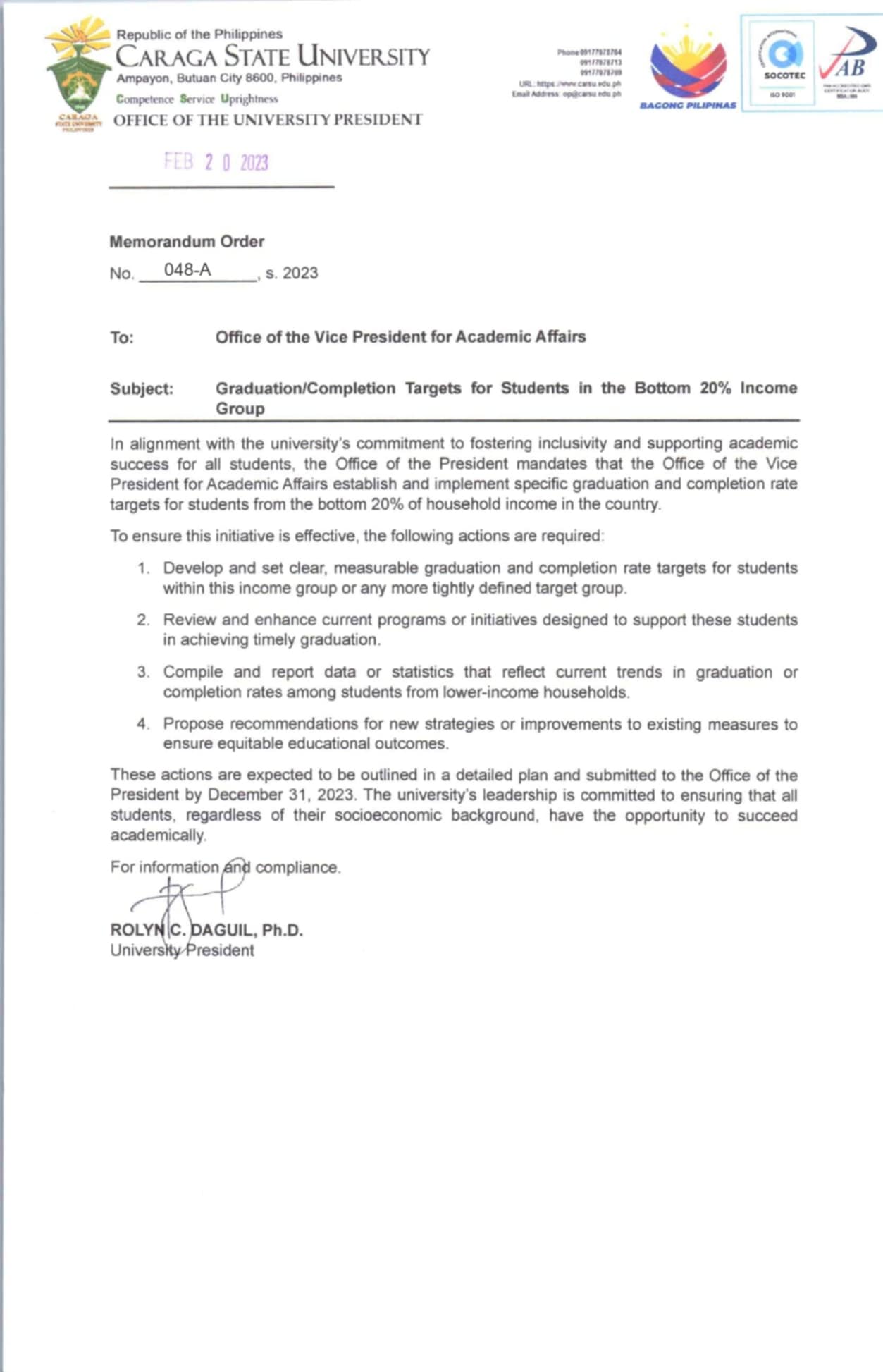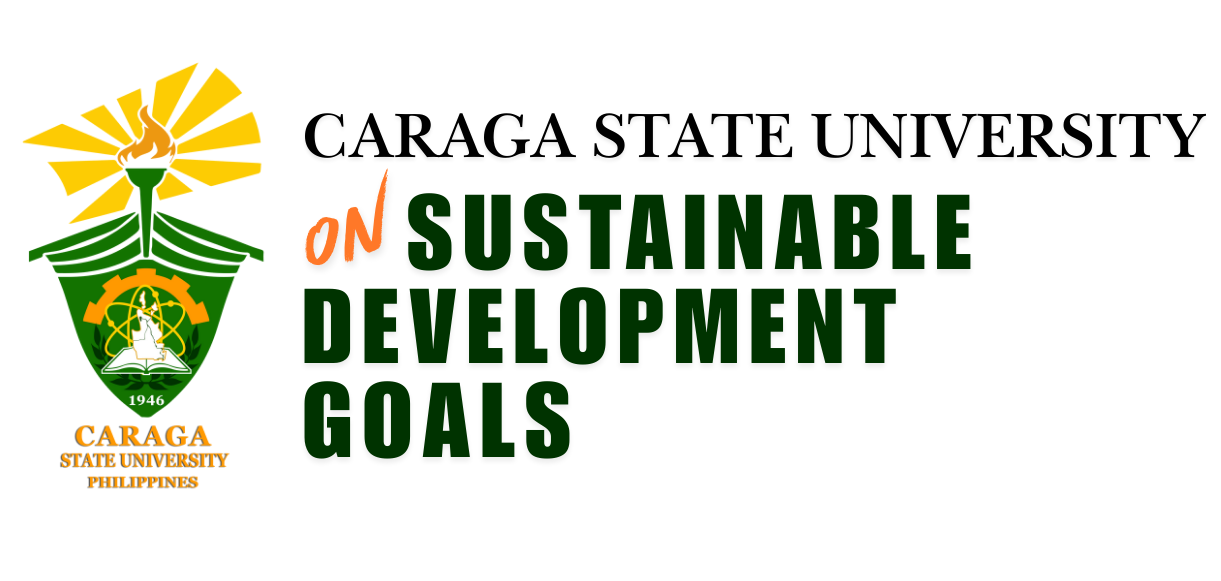Sustainable Development Goal (SDG) 1: No Poverty

Overview
Through strategic initiatives, impactful research, and active community engagement, CSU aims to create sustainable pathways out of poverty and promote social equity. Our policies and programs in Caraga State University reflect a holistic approach, encompassing education, economic empowerment, and partnerships that address the root causes of poverty. By aligning our strategic objectives with SDG 1, we strive to make a meaningful difference in the lives of individuals both locally and globally.

Research, Development, Innovation, and Extension (RDIE) Contributions
CSU has actively pursued targeted initiatives and community development programs aimed at enhancing livelihood opportunities and fostering economic self-reliance among local populations. By strategically leveraging its academic and research capabilities, CSU has introduced evidence-based solutions that directly contribute to poverty alleviation.
Central to CSU’s approach is its commitment to conducting comprehensive, data-driven research that informs policy and program development. These research efforts are designed to identify the most effective methods for boosting economic activities, improving access to resources, and empowering communities through informed decision-making. By aligning research with real-world applications, CSU bridges the gap between academic inquiry and practical, impactful solutions.
CSU’s documented contributions include four significant research-driven projects that lay a strong foundation for future poverty reduction initiatives. These projects have focused on areas such as sustainable agriculture, microenterprise development, and technology-based education, providing scalable models that address the unique challenges of the region. Collaborative partnerships with local government units, non-governmental organizations, and industry stakeholders have amplified the reach and effectiveness of these research initiatives.
The university’s dedication to Goal 1 extends beyond short-term outcomes; it emphasizes a long-term vision rooted in continuous research and innovation. By fostering interdisciplinary collaboration and strategically investing in research-driven solutions, CSU aims to create sustainable economic frameworks that empower communities and contribute to regional and national objectives of poverty eradication. Through ongoing research efforts, CSU remains committed to making a meaningful and measurable impact on poverty reduction and inclusive growth.
Key Initiatives and Projects (2023) - HIGHLIGHTS
CSU has several initiatives and achievements that align with Sustainable Development Goal 1 (No Poverty) by focusing on improving socioeconomic conditions, particularly for marginalized communities. Notable examples include:
DOH – Women of Reproductive Age (WRA) Project
Preparation Meeting for Data Gathering. The recent update includes the issuance of an ethics certificate from the CHRDC ethics board and approval from the PSA committee. This allows the research team to proceed with the data gathering With this, the team set a questionnaire orientation for the enumerators on February 7, 2023, to be held at Kinaadman Conference Room.
Learn more from the CSU 1st Quarter Report for the year 2023
Extension Project for Coffee Production
Extension project titled “Caraga Region Coffee Production Build-up through S&T based interventions”
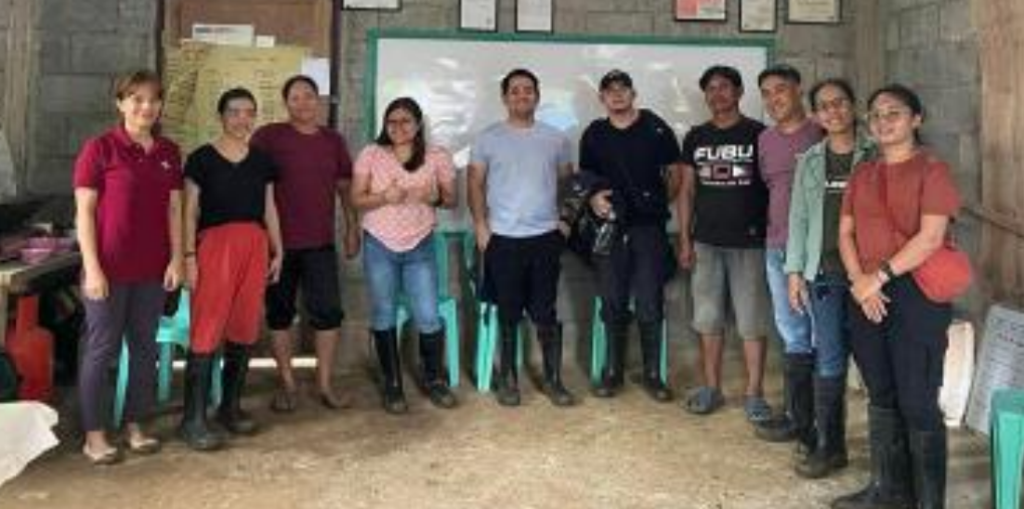
The College of Agriculture and Agri-Industries is in the preparation stage for the submission of required documents for the approval and implementation of an extension project titled “Caraga Region Coffee Production Build-up through S&T based interventions” to be funded by the Department of Science and Technology – Regional Office (XIII). The proposed extension project generally aims to improve farm practices, productivity, and socio-economic status of the coffee growers in Brgy. Simabalan, Buenavista, Agusan del Norte through S&T based interventions. There will be 3 project components, the Component 1: Baseline Data Collection of Farmers Field Practices and Economic Status for proper S&T based intervention; Component 2: Boosting Farmers Knowledge and Adaptation to S&T Based Technology, and Component 3: Demo-Farm Establishment. Project will hopefully be approved by the DOST with a proposed budget of PhP 1,875,000.00. The few members of this extension team together with the DOST personnel visited the Sitio Antipolo Farmers Association Buenavista Agusan del Norte Inc (SAFABAI), the beneficiary of the project, last January 25, 2023. The purpose of the visit is to gather initial information that would help in planning out the activity for the whole year.
DOST-NSTEP Lumad Spirituality Project
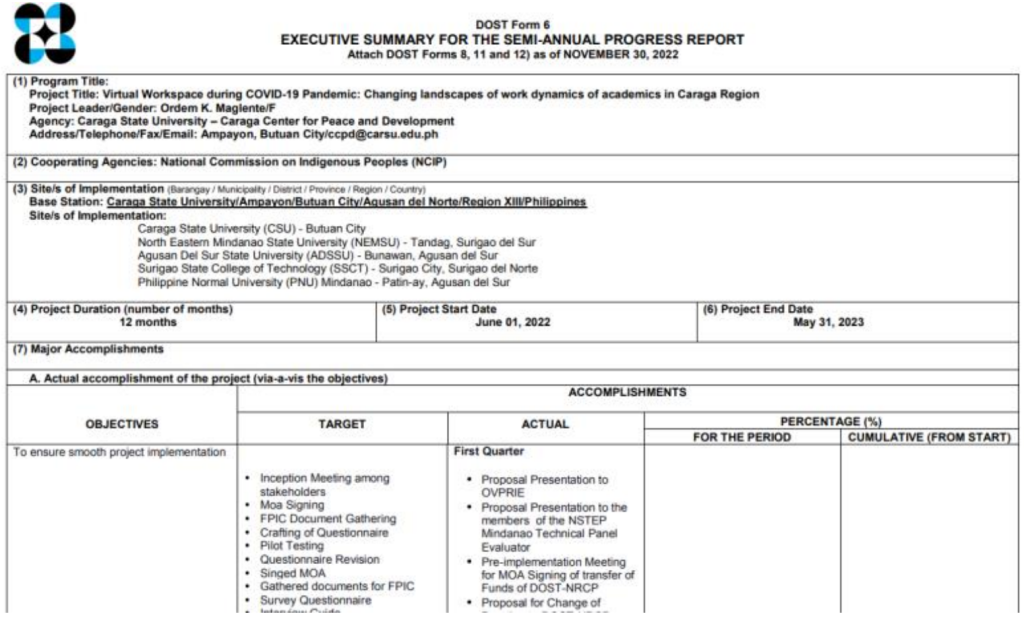
The project has the following accomplishment: (1) finding validators and setting the schedule for instrument and project validation, (2) Submission of quarterly report to DOST-NSTEP by filling up DOST form 6 and 8, (3) submission of Video Accomplishment Presentation to DOST-NSTEP Mindanao, and (4) Meeting Preparation for 2nd Quarterly Accomplishment Virtual Report on January 30, 2023.
Learn more from the CSU 1st Quarter Report for the year 2023
Support for Vulnerable Populations
Linkages and Partnerships
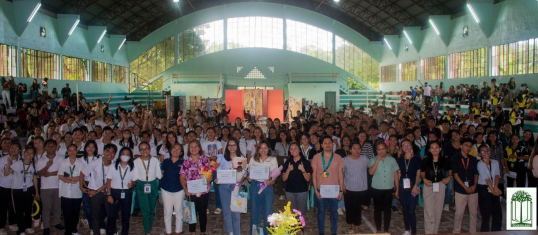
The last quarter of year at Navigatu is highlighted by several conferences, summits, and trainings. One of which is the 8th Mindanao ICT Cluster Conference where the Incubation Project Head of Navigatu, Ms. Jenelyn R. Asis was invited to speak about WHWise (Women Helping Women: Innovating Social Enterprise Program). WHWise is a program run by DOST where Ms. Asis served as one of the mentors of the national finalists and representative of the Caraga region.
Ms. Asis talked about the role of Navigatu in helping the MSMEs in the region realize the importance of being able to address the needs and wants of the customers to enable entrepreneurs to properly position themselves and their enterprises to gain traction.
Outreach Programs Livelihoods
PREPARED Pagatpatan
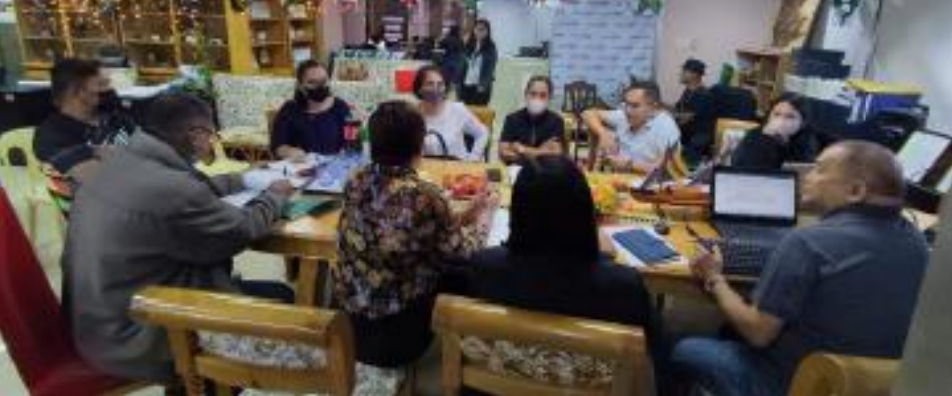
A meeting of the Technical Working Group for PREPARED-Pagatpatan, hosted by the Butuan City Tourism Office, was conducted on December 1, 2022, held at the City Tourism Office, Butuan City Hall. They have discussed the turn-over and other activities to be undertaken after. The TWG also discussed the roles and responsibilities for the Pagatpatan Wetland Learning Center (PWLC). The Caraga State University was assigned for the Interior and Landscaping Design of PWLC.
Learn more from the CSU 1st Quarter Report for the year 2023
Educational Support Initiative
Caraga State University Joins Forces with MSU-IIT and USTP to Launch Center for Integrated Circuits and Devices Research

Dr. Rolyn C. Daguil, President of the Caraga State University, signed a Memorandum of Agreement with the Mindanao State University-Iligan Institute of Technology (MSU-IIT) and the University of Science and Technology of Southern Philippines (USTP) to establish a Center for Integrated Circuits and Devices Research (CICDR). The project, funded by the Department of Science and Technology, aims to increase the national capability in integrated circuit design, increase competitiveness in electronics and semiconductors, and create a sustainable local IC design ecosystem. The establishment of the center aligns with President Daguil’s LIKHA Agenda and the three universities’ leaders pledged to support research excellence in IC design. The project leader will be Dr. Jefferson Hora of MSU-IIT and was witnessed by several directors, chairpersons, and faculty members from the participating universities.
Infrastructure and Technical Assistance
PATENT MINING TRAININGWORKSHOP
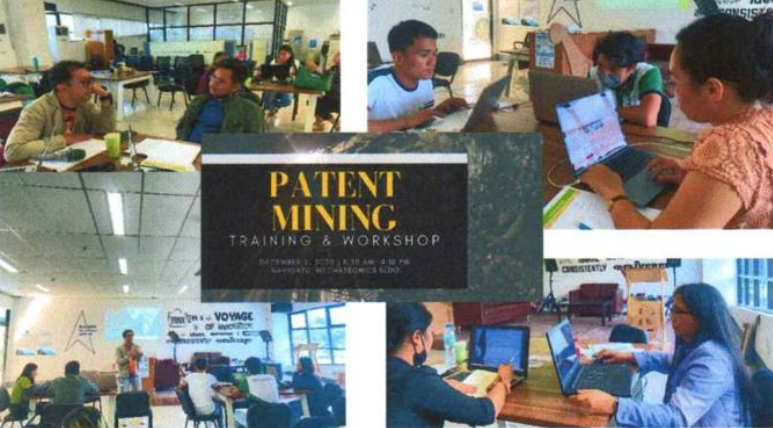
The Intellectual Property and Technology Business Management (IP-TBM) Patent Mining Project, under the management of the Technology Transfer and Licensing Office (TTLO) of the OVPRIE, conducted a face-to-face Training and Workshop on Patent Mining last December 2, 2022, at the Navigatu, Mechatronics Building. A total of twenty-one (21) faculty researchers, staff, and College Intellectual Property Coordinators (CIPCs) from the main and Cabadbaran campuses were present during the event.
Caraga State University Joins Forces with MSU-IIT and USTP to Launch Center for Integrated Circuits and Devices Research
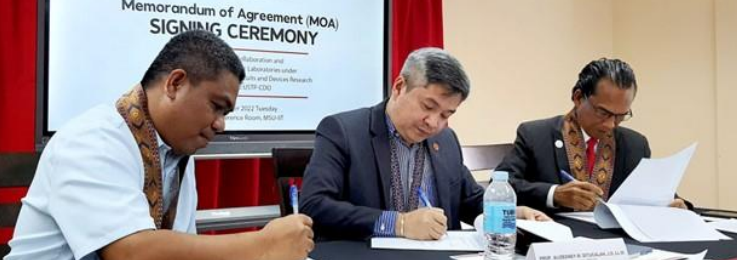
Dr. Rolyn C. Daguil, President of the Caraga State University, signed a Memorandum of Agreement with the Mindanao State University-Iligan Institute of Technology (MSU-IIT) and the University of Science and Technology of Southern Philippines (USTP) to establish a Center for Integrated Circuits and Devices Research (CICDR). The project, funded by the Department of Science and Technology, aims to increase the national capability in integrated circuit design, increase competitiveness in electronics and semiconductors, and create a sustainable local IC design ecosystem. The establishment of the center aligns with President Daguil’s LIKHA Agenda and the three universities’ leaders pledged to support research excellence in IC design. The project leader will be Dr. Jefferson Hora of MSU-IIT and was witnessed by several directors, chairpersons, and faculty members from the participating universities.
Learn more from the CSU 1st Quarter Report for the year 2023
Well-Being, Realizations, and Aspirations of Indigenous People's Students
Well-Being, Realizations, and Aspirations of the Indigenous People’s Students from Poverty-Stricken Families in Caraga Region | Funded by DOST XI -NRCP
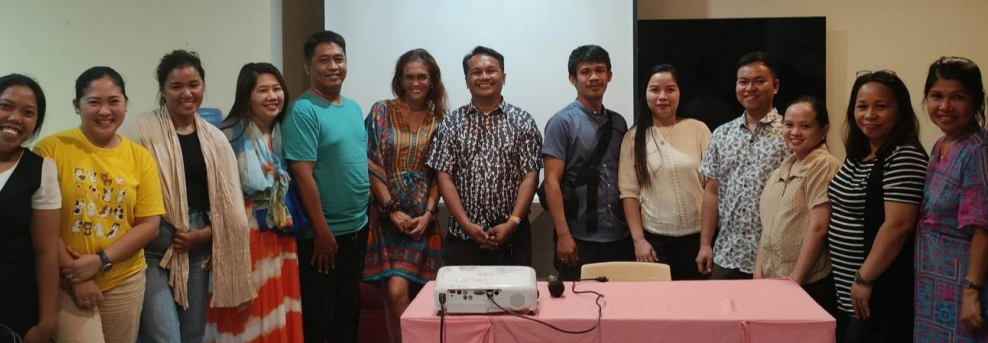
Trainings Conducted:
April 19, 2023 – Data Validation and Interviews with the IPEd Focal Persons of the 3 School Divisions in the Caraga Region April 27 to 28, 2023 – Training Workshop on Interpretation and Data Analysis @ Ocean Point, Lianga, Surigao Del Sur.
A three-day training workshop was successfully conducted to enhance researchers’ abilities to organize, summarize, and interpret data in line with their research objectives, with 46 participants in attendance. Among the participants were 30 members from the tribal community and 16 individuals from the College of Education and the research project team. Esteemed speakers Dr. Alvic A. Arnado and Dr. Joyce M. Suganob, from Caraga State University’s College of Education, delivered insightful talks on quantitative and qualitative data interpretation and analysis, respectively. Practical knowledge and skills were provided to participants, allowing them to apply these methods to their research projects. The workshop also featured a write-shop where participants worked on refining their research outputs based on the discussed data analysis methods. The event fostered collaboration among participants, and the workshop concluded with the packaging of comprehensive research reports. The workshop’s success contributed to improving the well-being and aspirations of Indigenous People’s students from poverty-stricken families in the Caraga Region, and participants expressed gratitude for the knowledge gained and the opportunity to collaborate and learn from each other.
Learn more from the CSU 2nd Quarter Report for the year 2023
Community Needs Assessment
Community Needs Assessment | April 15, 19, and 26, 2023
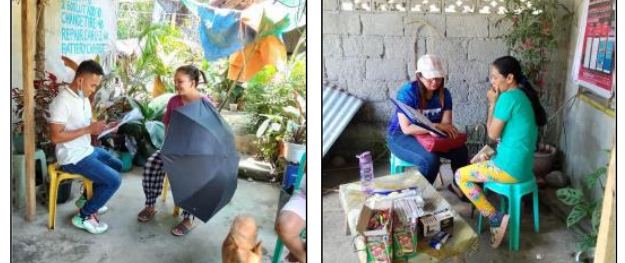
The Office of Research, Development, and Extension, along with the Home Economics Ready Organization (HERO) members and Caraga State University Cabadbaran Campus faculty members, collaborated to conduct a community needs assessment. The team divided into ten (10) groups visited different puroks within the selected barangay to collect data
Learn more from the CSU 2nd Quarter Report for the year 2023
Training and Support for MSMEs
Navigatu Empowers Women-Led MSMEs Through Innovation Training
Navigatu, a leading innovation hub, conducted a 2-day training program for 16 Women Lead Micro Small Medium Enterprises (MSMEs) as part of the DOST Women Helping Women: Innovating Social Enterprise (WHWise) National Innovation Challenge on June 9-10, 2023. Led by Prof. Melbert R. Bonotan, Navigatu TBI Director, and Ms. Jenelyn B. Refamonte-Asis, Incubation Project Head, the training provided valuable insights. The discussion covered market pull innovation strategy, human-centered design approach, value proposition canvas, product development strategies, and social innovation for inclusive business and social impact. Navigatu’s efforts aimed to equip women-led MSMEs with the knowledge and skills needed to thrive in the competitive business landscape
Learn more from the CSU 2nd Quarter Report for the year 2023
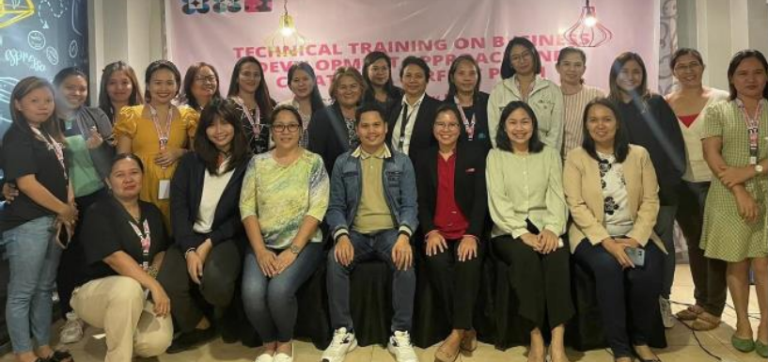
Skills Profiling and Youth Training for Local Product Marketing
Development of Paper-based Colorimetric Sensor Utilizing Varied Sizes of Gold Nanoparticles for Rapid and On-site Detection of Various Meat Products Spoilage | Funded by CHED-LAKAS
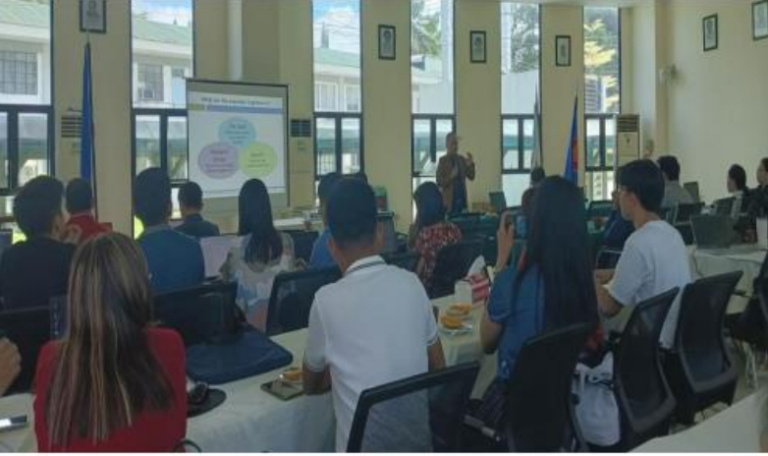
TRAINING CONDUCTED: Training Writeshop on Effective Scientific Writing for Journal Publication and Research Proposals @ Conference Hall, New Admin Building, Caraga State University, Butuan City on April 3-4, 2023.
A training write-shop was conducted as part of a project’s capacity-building initiatives, focusing on broadening participants’ expertise in science and technology and improving their research writing skills. Faculty members from various departments, including Agriculture, Biology, Chemistry, Forestry, and Mathematics, participated in the write-shop. The event commenced with opening messages from Engr. Jeffrey Dellosa, VP for Research, Innovation, and Extension, and Dr. Rolyn C. Daguil, University President, followed by a rationale of the activity by Dr. Felmer S. Latayada, the CeNTRE Director. Two resource speakers, Dr. Rey Y. Capangpangan and Dr. Arnold C. Alguno, both esteemed professors, shared their knowledge and expertise in research. The write-shop included interactive discussions, brainstorming sessions, and draft preparation, with participants grouped according to their field of interest. The second day focused on hands-on activities, where participants presented and received critiques on their research proposals and publication drafts. The training write shop facilitated constructive exchanges and provided valuable insights to enhance participants’ research writing skills. The event concluded with a closing message from Dr. Felmer S. Latayada, followed by a photo opportunity.
Learn more from the CSU 2nd Quarter Report for the year 2023
Caraga Region Coffee Production Initiative
Caraga Region Coffee Production Build-up through S&T Based Interventions
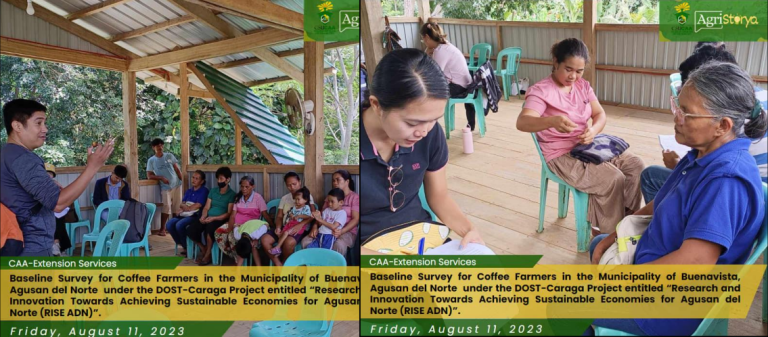
The CAA is co-implementing an extension project called “Caraga Region Coffee Production Build-up through S&T-based Interventions” under the RISE ADN project of DOST-Caraga. On August 11, 2023, an on-site baseline survey was conducted among coffee farmers in Simbalan, Buenavista, Agusan del Norte. The survey will help establish a strong assessment of indicators that will be used to evaluate the achievement of outcomes and identify relevant needs through research and extension in bridging the gap for coffee farmers in Simbalan, Buenavista, Agusan del Norte.
Learn more from the CSU 3rd Quarter Report for the year 2023
Technology Transfer for Sago Processing
Technology Transfer “Sago Processing Technology-Phase
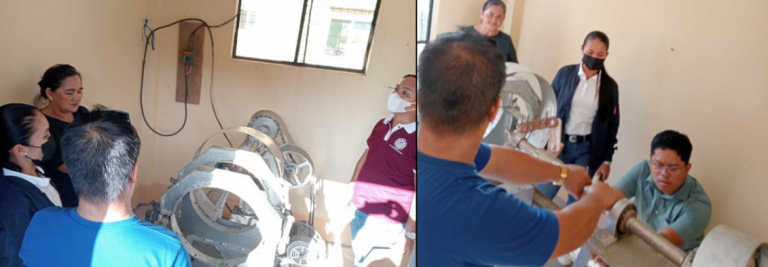
On September 7, 2023, a monitoring activity was conducted at Baan km 3, Butuan City to assess the status of the sago processing technology that was deployed to the members of the Kaba-ang Livelihood Association. During the monitoring, the extension project team paid a courtesy call to Hon. Gemma P. Tabada, the barangay captain of Baan km 3, Butuan City. A brief meeting was held to update and plan the next step in the implementation of the extension project and to discuss the status of the utilization of the deployed technology.
Learn more from the CSU 3rd Quarter Report for the year 2023
Technology Transfer and Community-Based Livelihood Programs
Technology Transfer “Sago Processing Technology”-Phase 2 Activities
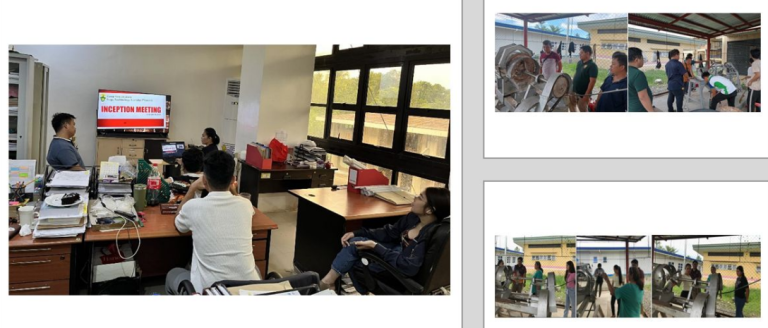
The project team together with the other faculty members of the Department of Agricultural and Biosystems Engineering conducted last October 16, 2023, an inception meeting to plan out the retrofitting activity and the monitoring activities that will be conducted to fit the deployed technology to the needs of the members of the Kaba-ang Livelihood Association of Barangay Baan, km 3, Butuan City and to continuously monitor the status of utilization of the deployed technology.
After the inception meeting, the project team together with members of Kaba-ang Livelihood Association and some ABE students conducted a retrofitting activity for the Sago rasping machine that was previously deployed to the association. The activity was done to replace one of the electrical motors of the machine and to fit the machine based on the needs of the recipients.
On the 24th of November 2023, another set of ABE students accompanied the project team at Barangay Baan, km 3 in Butuan City to conduct a monitoring activity. During the activity,
Hon. Agnes Sas, the president of the Kaba-ang Livelihood Association discussed on what they want to improve the machine’s performance.
Learn more from the CSU 4th Quarter Report for the year 2023
Entrepreneurship and Skill Development
Navigatu Initiatives

The last quarter of year at Navigatu is highlighted by several conferences, summits, and trainings. One of which is the 8th Mindanao ICT Cluster Conference where the Incubation Project Head of Navigatu, Ms. Jenelyn R. Asis was invited to speak about WHWise (Women Helping Women: Innovating Social Enterprise Program). WHWise is a program run by DOST where Ms. Asis served as one of the mentors of the national finalists and representative of the Caraga region.
Ms. Asis talked about the role of Navigatu in helping the MSMEs in the region realize the importance of being able to address the needs and wants of the customers to enable entrepreneurs to properly position themselves and their enterprises to gain traction.
Prof. Melbert R. Bonotan, MSc., was invited as the resource person of North Eastern Mindanao State University-College of Information Technology Education Technofair. The director delivered a talk about Crafting and Delivery of Pitch and Hackathon.
The Director also graced the Journey in Venture Financing in Entrepreneurship, a talk for The Entrepreneurial Mindset students in Caraga State University-Cabadbaran Campus on October 23, 2023. This talk was aimed at equipping both students and faculty in appreciating entrepreneurship as an opportunity to earn income and become an entrepreneur.
Learn more from the CSU 4th Quarter Report for the year 2023
Economic Empowerment through Startups
CSU, partner agencies host Caraga Heathcon 2023
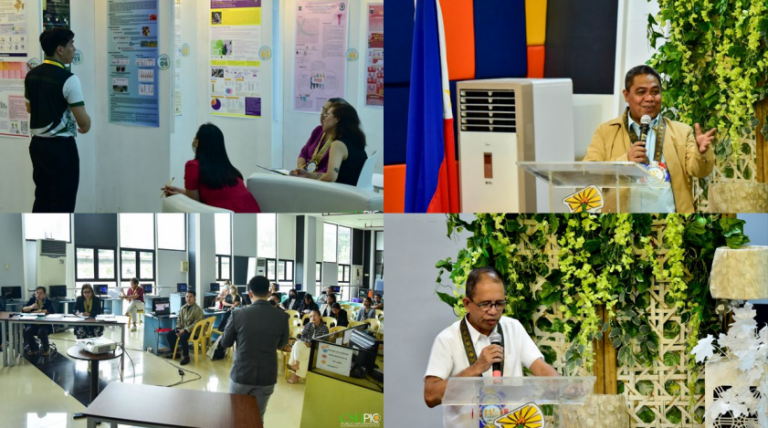
The Caraga State University, along with the Caraga Health Research and Development Consortium (CHRDC), the Department of Science and Technology (DOST), and the Department of Health-Caraga (DOH-Caraga) welcomed its participants for the Caraga Healthcon 2023 at the H.E.R.O Learning Commons Auditorium last November 8-9, 2023. This is the 6th convention that CHRDC has organized to date.
This year’s theme revolved around “Sustainable Development in Caraga: Resilience through Health Research, Technology, and Innovation.” Various academic institutions, agencies, experts, and stakeholders attended the convention to either facilitate or participate in the following activities: Plenary Sessions, 3-minute Pitch to Policymakers Competition, Wellness Sessions, Health Quiz Bowl, Visual Poster Exhibit Contest, Oral Health Research Paper Presentation, and Health Technology Idea Pitching Competition.
Learn more from the CSU 4th Quarter Report for the year 2023
Partnerships for Economic Advancement
Technology Transfer/Commercialization
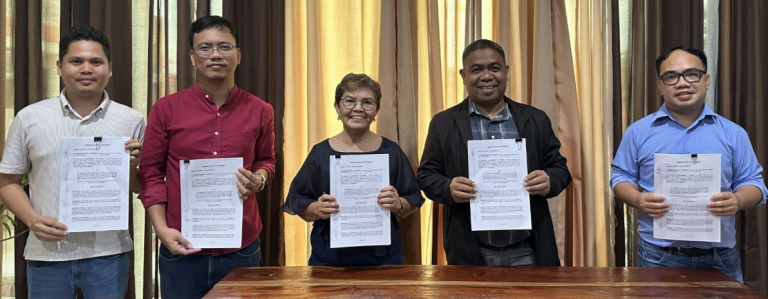
Technology Commercialization poses persistent challenges for TTLO. Recognizing the significance of connecting with stakeholders and potential technology adopters, TTLO has undertaken several strategic activities to facilitate this process.
Commercialization of Mapx
MOA with Municipal Government of Mainit
Memorandum of Agreement between the Municipal Government of Mainit and Caraga State University done on September 1, 2023 for the technology commercialization of “Manage your Assets, Properties and Map it for Visualization”, otherwise known as “MapX”, a software platform for online WebGIS mapping, specifically, tax mapping, parcellary mapping, property valuation and assessment, tax collection, spatial analysis visualization, and map digitization in which LGU-Mainit shall allocate the amount of Three Hundred Thousand Pesos (Php 300,000.00) to CSU as the Contract Price.
Learn more from the CSU 4th Quarter Report for the year 2023
Training and Capacity-Building Programs
Consultancy Services and Speaking Engagements
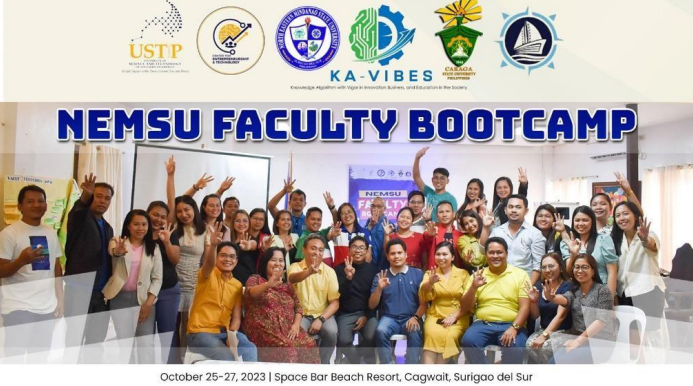
The Technofair was later on followed by the NEMSU KA-VIBES TBI Faculty Bootcamp held at Cagwait, Surigao del Sur from October 25-27, 2023. This bootcamp aims to teach faculty on Tech101 and craft the Tech101 syllabus and course guide, orient the faculty on the proper protocols in Technology Pitching and Pitching Competition, and to train faculty members in
technopreneurship and share students’ incubation program best practices.
The NEMSU Faculty Bootcamp was conducted in collaboration with CDOBites and Navigatu, Technology Business Incubators from University of Science and Technology of Southern Philippines-CDO and Caraga State University.
On November 8-9, 2023, TBI Director, Prof. Melbert R. Bonotan, MSc was invited as one of the resource speakers for the Women Helping Women: Innovating Social Enterprises (WHWise): Accelerating Innovation and Inclusive Entrepreneurial Ecosystem for Women in Caraga. The series of training and workshops led by the director was aimed at capacitating women entrepreneurs on Marketing and Business Mindsets, Designing of Business Model and Value Proposition Canvas, and Segmentation, Targeting and Positioning.The TBI Director was joined by the RAISE ATBI Project Development Office, Mr. Elpedio Corbeta, also as one of the resource speakers.
Learn more from the CSU 4th Quarter Report for the year 2023
Participation in Regional and National Competitions
CSU Secures championship and third prize in DOST's RICE 2023 - Mindanao
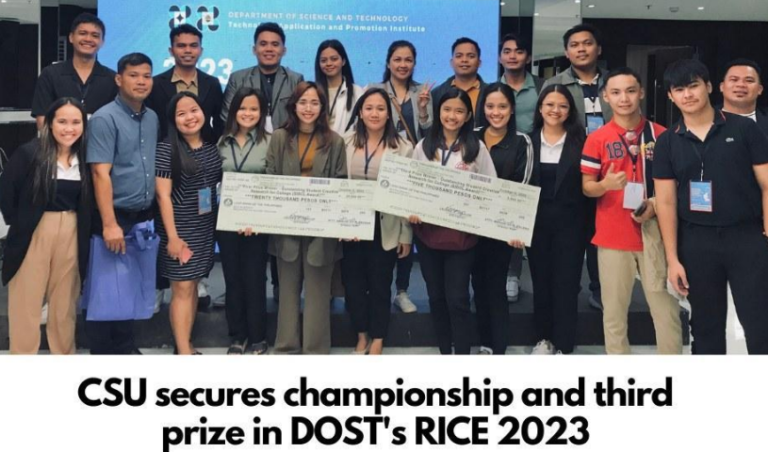
Caraga State University (CSU) has emerged as a powerhouse of innovation and excellence, securing top honors at the DOST 2023 Regional Invention Contest and Exhibits, held in Cagayan De Oro City on October 4-5, 2023. The university clinched the championship and secured the third prize, demonstrating the exceptional talents and commitment of its students and faculty
The Champion for the SIBOL WARD for Outstanding Student relative Research for College was warded to Ms. Leizl B. Caserialand Christine Laurence Cocon, while Ms. Hanzel Caringal claimed the third prize.
Learn more from the CSU 4th Quarter Report for the year 2023
Educational and Support Initiatives
CMNS,CCIS clutch top awards at HealthCon 2023
Students from the College of Mathematics and Natural Sciences (CMNS) and the College of Computing and Information Sciences (CCIS) secured top spots in the competitions held during HealthCon 2023, the 6th Caraga Health Research and Development Convention at the HERO Learning Commons from November 8-9, 2023.
Coach Mr. Jashin C. Rosal and his students Yanna Heart Bande, Kate Lindsay Montesclaros, and Jabes Nemuel A. Sono from the Department of Biology emerged as First Place (Champion) in the Health Quiz Bowl. In addition, two startup products, VibrioSolve and Mental Boost, representing CMNS and CCIS respectively, were chosen among the Top 5 Finalists in the Health Technology Ideation Pitching.
Learn more from the CSU 4th Quarter Report for the year 2023
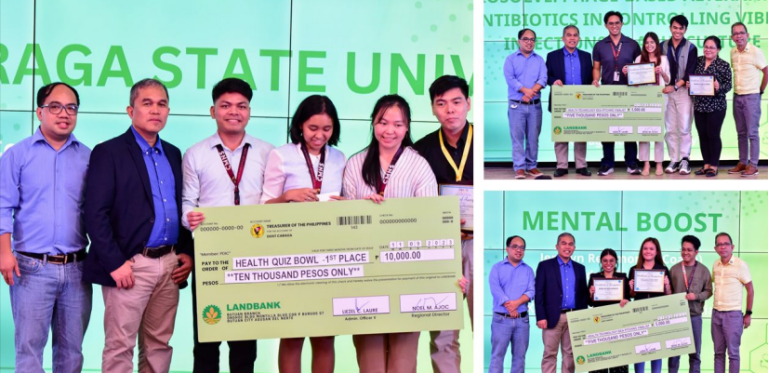
Community Outreach and Consultations
Provision of Technical Assistance on the Formulation and/or Updating of the Risk-Informed Comprehensive Development Plans

The CSU Center of Research for Ecosystem Management and Eco-governance (CRÈME) assisted the select Local Government Units in the region in updating its Comprehensive Development Plans. Several activities conducted including the Orientation and Action Planning were delivered. The series of technical assistance ran from July to October 2023 with the assistance of certified environmental planners, planning officers, and technical experts from DILG and LGUs. A total of 12 activities were conducted for the said technical assistance which started with a consultation or integration meeting with the invited partners from DHSUD and CSU.
Short-term training program for the preparation of a risk-informed comprehensive development plan of LGU Tubay, Agusan del Norte
The Local Government Unit (LGU) of Tubay, Agusan del Norte requested a short-term training program for the preparation of a risk-informed comprehensive development plan. This short training course was talked over with DILG Regional Office 13 sometime in October of this year. Caraga State University (CSU), being an academic institution, possesses the necessary personnel and technical expertise to provide its services in the development and packaging of the Risk-Informed CDP.
The training method is a mix of online and in-person sessions. The blended seminar is set for November 28th through November 30th, 2023. CDP+ output was presented and criticized on December 18 and 19, 2023. LGU-Tubay is required to pay a training fee of P74,000.00, which will be utilized to cover various expenses such as the training kit, honorarium for resource speakers, training assistant, and incidental costs.
Learn more from the CSU 4th Quarter Report for the year 2023
IMPACT Ranking Criteria Results
Metric 1.2 Proportion of students receiving financial aid to attend university because of poverty
The data from Caraga State University (CSU) regarding the number of enrolled students for the 2nd semester of AY 2022-2023, the midyear term, and the 1st semester of AY 2023-2024 provides an insightful overview of the university’s enrollment distribution across various colleges and programs.
Metric 1.2.1. Overall Enrollment
The grand total of students enrolled across all colleges and terms at Caraga State University reached 21,853 for the two semesters in 2nd Semester AY 2022-2023 (January 2023 to May 2023), midyear term (June to July 2023), and 1st Semester AY 2023-2024 (August 2023 – December 2023). This distribution underscores the university’s diverse academic offerings, with strong enrollments in both traditional fields like agriculture and forestry and emerging fields such as information technology and engineering.
Table 1: Summary of the enrollment data at Caraga State University (CSU) across various colleges and programs:
| College | Total Enrollment | Notable Programs | Enrollment in Key Programs |
| Graduate School | 1,725 | MAEd in Educational Management, MSIT | MAEd EM: 230, MSIT: 86, EdD EM: 51 |
| College of Agriculture and Agri-Industries (CAA) | 2,477 | BSA, BAT | BSA: 1,239, BAT: 542 |
| College of Computing and Information Sciences (CCIS) | 3,236 | BSIT, BSIS, BSCS | BSIT: 1,459, BSIS: 1,009, BSCS: 768 |
| College of Education (CEd) | 3,234 | Elementary Education, Secondary Education | Elem. Ed: 801, Sec. Ed. (Science): 1,120 |
| College of Engineering and Geo-Sciences (CEGS) | 3,498 | Agricultural & Biosystems Eng., Geodetic Eng. | Agr. & Bio. Eng.: 819, Geodetic Eng.: 735 |
| College of Forestry and Environmental Sciences (CoFES) | 2,676 | Forestry, Environmental Science | Forestry: 1,257, Env. Science: 764 |
| College of Humanities and Social Sciences (CHaSS) | 2,911 | Psychology, Social Work | Psychology: 1,059, Social Work: 1,063 |
| College of Mathematics and Natural Sciences (CMNS) | 2,096 | Biology, Chemistry, Applied Mathematics | Biology: 1,027, Chemistry: 280 |
– – – Table ends here – – –
Graduate School Enrollment
The graduate programs at CSU showed significant variation in enrollment. The Doctor of Philosophy in Science Education with a specialization in Biological Sciences (PhD SciEd BS) had a total enrollment of 47 students across the three terms. Other notable enrollments include the Doctor of Education in Educational Management (EdD EM) with 51 students and the Master of Science in Information Technology (MSIT) with a substantial count of 86 students. The Master of Arts in Education (MAEd) with a specialization in Educational Management (EM) stood out with the highest number, reaching a total of 230 students. In total, the Graduate School had 1,725 enrolled students over the observed periods.
College of Agriculture and Agri-Industries
The College of Agriculture and Agri-Industries (CAA) showed strong enrollment figures, particularly in the Bachelor of Science in Agriculture (BSA) program, which had a total of 1,239 students. Other programs, such as the Bachelor of Agricultural Technology (BAT), also had a significant presence with 542 students. The total enrollment for CAA was 2,477 students, showcasing the college’s robust contribution to CSU’s overall student population.
College of Computing and Information Sciences
The College of Computing and Information Sciences (CCIS) exhibited one of the highest enrollments, with a total of 3,236 students. The Bachelor of Science in Information Technology (BSIT) led the count at 1,459 students, followed by the Bachelor of Science in Information System (BSIS) with 1,009 students. The Bachelor of Science in Computer Science (BSCS) also showed a healthy enrollment with 768 students
College of Education
The College of Education (CEd) had a total enrollment of 3,234 students, driven largely by the Bachelor of Elementary Education with 801 students and the Bachelor of Secondary Education, major in Science with 1,120 students. This highlights the college’s essential role in training future educators, especially in STEM fields.
College of Engineering and Geo-Sciences
The College of Engineering and Geo-Sciences (CEGS) reflected a strong technical and engineering enrollment with 3,498 students. Bachelor of Science in Agricultural and Biosystems Engineering had 819 students, while the Bachelor of Science in Geodetic Engineering followed closely with 735 students. The Bachelor of Science in Mining Engineering also marked a significant enrollment with 725 students.
College of Forestry and Environmental Sciences
The College of Forestry and Environmental Sciences (CoFES) maintained an impressive enrollment figure of 2,676 students. The Bachelor of Science in Forestry led with 1,257 students, and the Bachelor of Science in Environmental Science contributed 764 students. This reflects the university’s commitment to sustainability and environmental education.
College of Humanities and Social Sciences
The College of Humanities and Social Sciences (CHaSS) had 2,911 enrolled students, with notable programs including Bachelor of Science in Psychology at 1,059 students and Bachelor of Science in Social Work with 1,063 students. This college’s enrollment highlights its focus on social sciences and human-centered studies.
College of Mathematics and Natural Sciences
Finally, the College of Mathematics and Natural Sciences (CMNS) had 2,096 students enrolled, with Bachelor of Science in Biology having the highest count at 1,027 students. Programs like Bachelor of Science in Applied Mathematics and Bachelor of Science in Chemistry also contributed significantly to the total.
Number of low-income students receiving financial aid
Based on the Philippine Statistics Authority (PSA) data, we consider the poverty threshold for a family in the Philippines, we identify students whose annual gross income falls below PHP 120,000 annually,
For the 2nd semester 2022-2023 (January 2023 to May 2023) there are 7,730 students at CSU with an annual gross family income below PHP 120,000, which can be considered under the low-income category according to typical poverty thresholds set by the Philippine Statistics Authority (PSA).
For the 1st semester 2023-2024 (August 2023 to December 2023), a total of 9,712 students fell under the low-income category with an annual gross family income below PHP 120,000.
The total number of students that fell under the low-income category is at 17,442 students. These are the students also that received financial aid through various scholarship programs from the university.
Scholarships and Financial Assistance: CSU provides various scholarships and financial aid programs to alleviate the financial burden on students. These programs are designed to cover tuition fees and may include stipends for living expenses. The Office of Student Affairs and Services (OSAS) oversees these initiatives, ensuring that eligible students receive the necessary support.
Document Link: https://www.carsu.edu.ph/?q=content%2Foffice-student-affairs-and-services-osas;
Document Link: https://www.carsu.edu.ph/?q=content%2Fprograms-and-services
Document Link: https://www.carsu.edu.ph/?q=scholarship%2Funiversity-funded-scholarship-programs
Metric 1.3. University anti-poverty programmes
In the Philippines, universities play a significant role in addressing poverty through various anti-poverty programs and initiatives aimed at supporting students and communities.
Scholarship Programs and Financial Assistance
- Free Higher Education (RA 10931): Caraga State University offer free tuition and financial assistance through the Universal Access to Quality Tertiary Education Act, ensuring that students from low-income backgrounds can pursue higher education.
- Tertiary Education Subsidy (TES): This is part of the RA 10931 initiative and provides allowances for living expenses, books, and supplies to qualified students in both public and private higher education institutions.
Community Extension Programs
- Livelihood Training and Workshops: Caraga State University has extension programs that offer skills training and livelihood workshops for marginalized communities. These programs help improve income-generating capabilities by teaching practical skills like entrepreneurship, handicrafts, and farming techniques.
- Outreach Programs for Indigenous Communities: Caraga State University engages with indigenous communities by providing education, healthcare, and social services, contributing to their empowerment and economic stability.
Research and Development Initiatives
- Poverty Alleviation Studies: Caraga State University conducts research on poverty reduction strategies, helping inform policymakers and implement sustainable development projects.
- Agricultural and Rural Development: Caraga State University actively engage in research to improve crop productivity and sustainable farming practices, directly benefiting farmers and rural communities.
Social Entrepreneurship and Incubation Centers
- Social Enterprise Programs: Caraga State University, through the Department of Science and Technology (DOST)-funded Technology Business Incubators (Navigatu and Tara) promote social entrepreneurship that focuses on business models aimed at poverty reduction. Students are encouraged to develop and scale solutions that create jobs and stimulate economic growth in underserved areas.
- Technology Business Incubators (TBIs): The Department of Science and Technology (DOST), in partnership with universities like Caraga State University, funds technology business incubators that support startups. There are two TBIs in CSU – Navigatu and Tara TBIs. These incubators often foster social innovation, which includes projects targeted at improving local livelihoods.
Feeding and Nutrition Programs
- School Feeding Initiatives: CSU partners with government agencies such as the Department of Education (DepEd) and Department of Social Welfare and Development (DSWD) to implement nutrition and feeding programs for students in areas with high malnutrition rates. This helps improve health and educational outcomes for children from low-income families.
Student Assistantships and Work-Study Programs
- On-Campus Employment: Caraga State University provide on-campus work opportunities for students to support themselves financially while completing their studies. This reduces the financial burden and helps students gain valuable work experience.
Sustainable Development Projects
- Eco-Social Programs: Caraga State University has environmental courses and an RDI Center in CREME that integrates environmental conservation projects with community development to ensure long-term socio-economic benefits.
- Renewable Energy and Water Projects: Caraga State University is involved in providing renewable energy and clean water solutions to remote communities, helping to alleviate energy poverty and improve quality of life.
These programs collectively support students and local communities, providing pathways out of poverty and contributing to inclusive growth and sustainable development in the Philippines.
1.3.1 Bottom financial quintile admission target. Targets to admit students who fall into the bottom 20% of household income group (or a more tightly defined target) in the country.
Caraga State University (CSU) has implemented several initiatives to support students from low-income households, particularly those in the bottom 20% of the income distribution. These efforts are evident in their admission policies and scholarship programs.
- Affirmative Action Plan (AAP): CSU offers an Affirmative Action Plan designed to provide additional opportunities for students who did not pass the university admission test. This plan aims to increase access to higher education for underrepresented and economically disadvantaged students. Document Link: https://www.carsu.edu.ph/?q=news/csu-launches-affirmative-action-plan-students-admission.
- Office for Admission and Scholarship (OAS): The OAS at CSU supervises admission strategies and scholarship programs that align with the university’s enrollment objectives. It collaborates with college deans to optimize the impact of institutional and foundation scholarships, ensuring that financial aid reaches students in need. Document Link: https://www.carsu.edu.ph/?q=oas-pages%2Foffice-admission-and-scholarship-oas
- Admission Requirements: As part of the admission process, CSU requires applicants to submit a photocopy of their parents’ Income Tax Return or a certificate from the Bureau of Internal Revenue (BIR). This documentation helps the university assess the financial status of applicants and identify those from low-income families who may qualify for financial assistance or scholarships. Document Link: https://www.carsu.edu.ph/?q=oas-pages%2Foffice-admission-and-scholarship-oas
These measures demonstrate CSU’s commitment to admitting and supporting students from the bottom financial quintile, thereby promoting inclusivity and equal access to education.
1.3.2. Bottom financial quintile student success
Graduation/completion targets for students who fall into the bottom 20% of household income group (or a more tightly defined target) in the country.
Caraga State University (CSU) is committed to supporting the academic success of students from low-income households, particularly those in the bottom 20% of the income distribution. To enhance their graduation and completion rates, CSU has implemented several initiatives:
- Scholarship Programs: CSU offers various scholarships aimed at financially disadvantaged students, providing them with the necessary resources to complete their education. These scholarships cover tuition fees and may include stipends for living expenses, reducing the financial burden on students and their families. Link: carsu.edu.ph
- Academic Support Services: The university provides tutoring, mentoring, and counseling services to assist students in overcoming academic challenges. These support systems are designed to help students maintain satisfactory academic progress and stay on track for graduation.
- Monitoring and Evaluation: CSU has established mechanisms to monitor the academic performance and progression of students from low-income backgrounds. Regular assessments allow for timely interventions, ensuring that students receive the support they need to succeed.
These initiatives reflect CSU’s dedication to fostering an inclusive educational environment where all students, regardless of their financial background, have the opportunity to achieve academic success.
1.3.3 Low-income student support
Provide support (e.g. food, housing, transportation, legal services) for students from low-income families to enable them to complete university.
Caraga State University (CSU) offers a range of support services to assist students from low-income families in completing their education. These services include:
- Scholarships and Financial Assistance: CSU provides various scholarships and financial aid programs to alleviate the financial burden on students. These programs are designed to cover tuition fees and may include stipends for living expenses. The Office of Student Affairs and Services (OSAS) oversees these initiatives, ensuring that eligible students receive the necessary support.
Document Link: https://www.carsu.edu.ph/?q=content%2Foffice-student-affairs-and-services-osas;
Document Link: https://www.carsu.edu.ph/?q=content%2Fprograms-and-services
Document Link: https://www.carsu.edu.ph/?q=scholarship%2Funiversity-funded-scholarship-programs
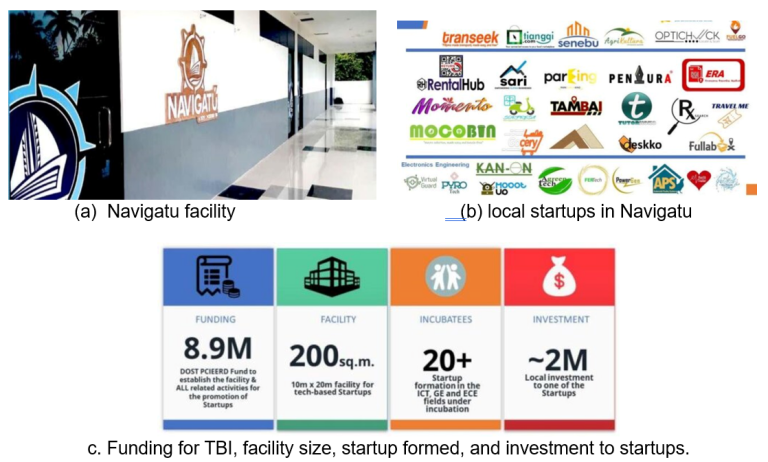
Source: https://www.researchgate.net;
- Student Housing: The university offers affordable and safe housing options for students. These accommodations are conducive to learning and are managed to ensure a secure living environment. The OSAS is responsible for coordinating these housing services.
Document Link: https://www.carsu.edu.ph/?q=content%2Foffice-student-affairs-and-services-osas;
Document Link: https://www.carsu.edu.ph/?q=content%2Fprograms-and-services
CSU also outlined the establishment of a Ladies and Gents Dormitory on its campus in Ampayon, Butuan City. This project, valued at approximately PHP 19.3 million, aimed to provide on-campus housing facilities to support the well-being and academic pursuits of its students. The initiative falls under the responsibility of CSU’s Bids and Awards Committee (BAC), which oversaw the tendering process in accordance with Republic Act No. 9184 and its Implementing Rules and Regulations (IRR). This ensures that all stages, from bid submission and evaluation to the eventual awarding and signing of the contract, are conducted transparently and adhere to national procurement standards.
The construction timeline for the dormitory was set at 270 calendar days, starting with pre-procurement conferences, and including scheduled activities such as bid advertising, pre-bid conferences, and bid opening. Interested bidders were required to provide a bid security, ranging from 2% to 30% of the approved budget for the contract, depending on the type of security instrument used. The dormitory is expected to significantly contribute to the CSU campus by offering safe and affordable accommodation, facilitating a better learning environment, and fostering a sense of community among the students
Document Link: https://www.carsu.edu.ph/?q=bids-and-awards-committee-reports/establishment-ladies-and-gents-dormitory
- Food Services: CSU provides accessible food services on campus to ensure that students have access to nutritious meals. These services are designed to be affordable, catering to the needs of students from various financial backgrounds.
Document Link: https://www.carsu.edu.ph/?q=content%2Fprograms-and-services
- Transportation Assistance: While specific transportation programs are not detailed, CSU’s comprehensive support system aims to address various student needs, potentially including transportation assistance for those from low-income families.
- Legal Services: The university offers guidance and counseling services that may include assistance with legal matters affecting students. These services are part of CSU’s commitment to student welfare and are managed by the OSAS.
Document Link: https://www.carsu.edu.ph/?q=gtc-page%2Fguidance-and-counseling-services
These support mechanisms reflect CSU’s dedication to creating an inclusive educational environment, ensuring that all students have the resources necessary to succeed academically.
1.3.4 Low or lower-middle income countries student support
Schemes to support poor students from low or lower-middle income countries (e.g. offering free education, grants).
Caraga State University (CSU) offers various support mechanisms to assist students from low-income backgrounds, including those from low or lower-middle-income countries. These initiatives aim to provide financial assistance and create an inclusive educational environment. Key programs include:
- University-Funded Scholarship Programs: CSU provides scholarships to deserving students, categorized into merit-based and non-merit-based programs. Merit scholarships are awarded based on academic performance, while non-merit scholarships support students actively engaged in specific areas of expertise. Document Link: https://www.carsu.edu.ph/?q=scholarship%2Funiversity-funded-scholarship-programs
- Government-Funded Scholarship Programs: The university facilitates access to various government-funded scholarships, such as the Commission on Higher Education (CHED) Full Merit and Half Merit programs, Iskolar ng Bayan, and others. These programs offer financial support to students, helping to cover tuition fees and other educational expenses. Document Link: https://www.carsu.edu.ph/?q=scholarships
- Office for Admission and Scholarship (OAS): The OAS supervises admission strategies and scholarship programs, ensuring the development and successful implementation of initiatives that support the university’s enrollment objectives. The office assists in screening applicants for various scholarships and financial assistance programs, helping to prepare and process necessary documents for fund release.
Document Link: https://www.carsu.edu.ph/?q=oas-pages%2Foffice-admission-and-scholarship-oas
These programs and services demonstrate CSU’s commitment to supporting students from low-income backgrounds, including those from low or lower-middle-income countries, by providing financial assistance and fostering an inclusive educational environment.
1.4 COMMUNITY ANTI-POVERTY Programs
1.4.1. Local start-up assistance
Provide assistance in the local community supporting the start-up of financially and socially sustainable businesses through relevant education or resources (e.g. mentorship programmes, training workshops, access to university facilities).
Caraga State University (CSU) actively engages in community development by supporting the establishment of financially and socially sustainable businesses. The university offers various programs and resources to assist local entrepreneurs:
a. Bachelor of Science in Entrepreneurship Program: CSU’s College of Business and Accountancy offers a Bachelor of Science in Entrepreneurship, designed to equip students with the skills necessary to initiate and manage successful business ventures. The program emphasizes practical knowledge and entrepreneurial competencies, preparing graduates to contribute to local economic development. Document Link: https://www.csucc.edu.ph/programs-offered/
b. Technology Business Incubators: Navigatu and Tara
- Navigatu: Established in 2018, Navigatu is a technology business incubator funded by the Department of Science and Technology (DOST) and hosted by CSU. It aims to foster innovation and entrepreneurship within the Caraga region by providing startups with essential resources, mentorship, and networking opportunities. Navigatu focuses on sectors such as fishing, agri-forestry, minerals, and ecotourism, aligning with the region’s economic strengths.
Document Link: https://www.facebook.com/navigatu;
Document Link: https://www.isip-ph.com/
Document Link: https://www.researchgate.net/;
Document Link: https://www.carsu.edu.ph/ - Caraga State University Technology Business Incubator (TBI) Director served as Technical Panel for the DOST Caraga 𝟮𝟬𝟮𝟯 𝗖𝗮𝗿𝗮𝗴𝗮 𝗪𝗼𝗺𝗲𝗻-𝗛𝗲𝗹𝗽𝗶𝗻𝗴-𝗪𝗼𝗺𝗲𝗻: 𝗜𝗻𝗻𝗼𝘃𝗮𝘁𝗶𝗻𝗴 𝗦𝗼𝗰𝗶𝗮𝗹 𝗘𝗻𝘁𝗲𝗿𝗽𝗿𝗶𝘀𝗲 𝗣𝗿𝗼𝗴𝗿𝗮𝗺 (𝗪𝗛𝗪𝗶𝘀𝗲)

Mr. Melbert Bonotan served as the trainer for this 𝟮𝟬𝟮𝟯 𝗖𝗮𝗿𝗮𝗴𝗮 𝗪𝗼𝗺𝗲𝗻-𝗛𝗲𝗹𝗽𝗶𝗻𝗴-𝗪𝗼𝗺𝗲𝗻: 𝗜𝗻𝗻𝗼𝘃𝗮𝘁𝗶𝗻𝗴 𝗦𝗼𝗰𝗶𝗮𝗹 𝗘𝗻𝘁𝗲𝗿𝗽𝗿𝗶𝘀𝗲 𝗣𝗿𝗼𝗴𝗿𝗮𝗺 (𝗪𝗛𝗪𝗶𝘀𝗲) The WHWise is a program implemented across regions, in partnership with DOST PCIEERD aimed to provide support to women social entrepreneurs through grants that will create impact, strengthen innovative culture, and benefit more communities in return.
For the Caraga WHWise Competition, 𝘀𝗶𝘅𝘁𝗲𝗲𝗻 (𝟭𝟲) 𝘄𝗼𝗺𝗲𝗻-𝗹𝗲𝗱 𝘀𝗼𝗰𝗶𝗮𝗹 𝗲𝗻𝘁𝗲𝗿𝗽𝗿𝗶𝘀𝗲𝘀 underwent a two-day technical training workshop on Business Development Approach and Creating a Perfect Pitch last June 8-9, 2023 at Almont City, Butuan. The training was spearheaded by Mr. Melbert R. Bonotan, Director of Navigatu, a DOST-funded Technology Business Incubator of Caraga State University.
The training aims to capacitate the women social entrepreneurs on (1) Target Customer Identification, (2) GAP Identification, (3) Product Fitting, (4) Value Proposition Development, (5) Business Model Development, and (6) How to Create a Perfect Pitch.
Tara: Tara is another TBI initiative by CSU, designed to support local startups through training workshops, mentorship programs, and access to university facilities for agricultural and fisheries targeting those low-income families in the agriculture and fisheries communities in Caraga Region. It emphasizes the development of sustainable business models that address community needs and promote economic growth.
Document Link: https://www.facebook.com/TARA.AgriAqua/
c. Provision of funding
Caraga State University (CSU) actively supports local startups by providing funding assistance and fostering an entrepreneurial ecosystem.
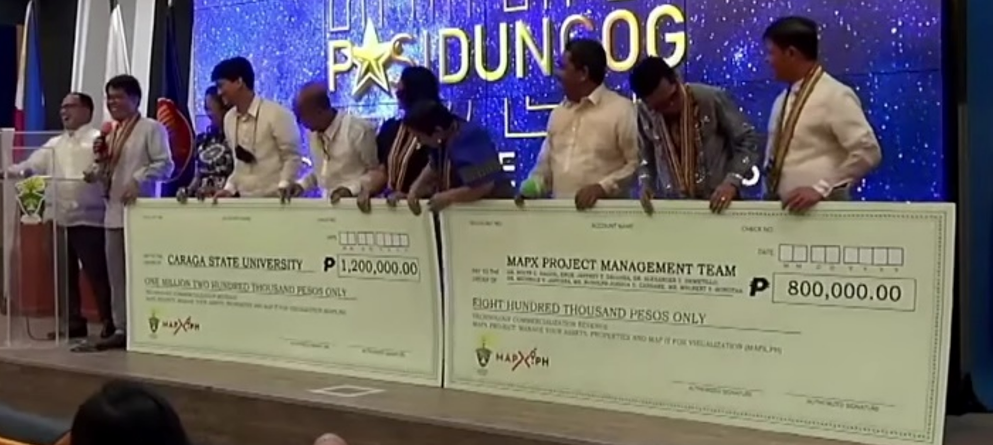
These initiatives reflect CSU’s commitment to empowering local communities through education, training, and direct support, thereby promoting sustainable economic development and poverty alleviation.
1.4.2. Local start-up financial assistance
Provide financial assistance to the local community supporting the start-up of financially and socially sustainable businesses.
Caraga State University (CSU) actively supports the development of financially and socially sustainable businesses within the local community through several key initiatives:
- Technology Business Incubators (TBIs):
- Navigatu: Established in 2018, Navigatu is a technology business incubator funded by the Department of Science and Technology (DOST) and hosted by CSU. It provides startups with essential resources, mentorship, and networking opportunities, focusing on sectors such as engineering, information technology, minerals, and ecotourism.
- Tara: Another TBI initiative by CSU, Tara offers financial support, training workshops, and access to university facilities for local startups focusing on agriculture, forestry, and fisheries. It emphasizes the development of sustainable business models that address agro-forestry and fisheries community needs and promote economic growth.
Caraga State University (CSU) actively supports local startups by providing funding assistance and fostering an entrepreneurial ecosystem.

Shown in this photo is the seed fund for the MapX Project Management Team. The MapX Team received Php 800,000.00.
- Tara: Another TBI initiative by CSU, Tara offers financial support, training workshops, and access to university facilities for local startups focusing on agriculture, forestry, and fisheries. It emphasizes the development of sustainable business models that address agro-forestry and fisheries community needs and promote economic growth.
- Collaboration with DOST-TAPI TECHNiCOM Program: CSU coordinates with the DOST’s Technology Application and Promotion Institute (TAPI) through the Technology Innovation for Commercialization (TECHNiCOM) Program. This program aims to fast-track the transfer, utilization, and commercialization of research and development outputs. By collaborating with TECHNiCOM, CSU facilitates access to funding and support for local startups, enhancing their capacity to bring innovative products and services to market.
- Startup Grant Fund (SGF) Program: CSU participates in the Startup Grant Fund (SGF) Program, which provides financial assistance to startups. This program aims to support the commercialization of innovative products and services, fostering entrepreneurship within the region.
- Collaboration with Government Agencies: CSU collaborates with various government agencies to facilitate access to funding programs for startups. For instance, the university works with the Department of Trade and Industry (DTI) and the Department of Science and Technology (DOST) to provide financial assistance and resources to local entrepreneurs.
Caraga State University also partnered with DOST Caraga for the 2023 Caraga Women-Helping-Women: Innovating Social Enterprise (WHWise) Program mentoring and funding, with the search for the most innovative women-led enterprises in Caraga Region held last June 13, 2023
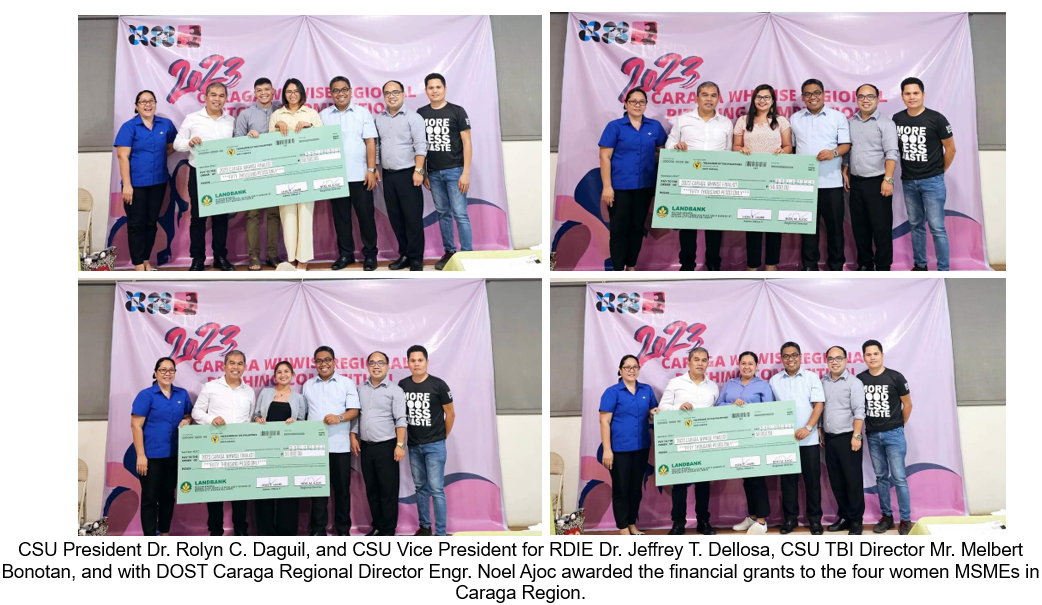
These initiatives demonstrate CSU’s commitment to fostering an entrepreneurial ecosystem that supports the establishment and growth of sustainable businesses within the local community.
1.4.3. Programmes for services access
Organise training or programmes to improve access to basic services for all.
Caraga State University (CSU) is dedicated to enhancing community access to essential services through various training programs and initiatives. These efforts aim to empower local communities by providing education and resources in key areas:
In 2023, Caraga State University (CSU) focused on several key initiatives to improve access to basic services for local communities through training programs and capacity-building efforts:
a. Training on Livelihood and Community Health:
Community-Based Trainings: Throughout 2023, CSU organized multiple training sessions aimed at enhancing local knowledge in sustainable livelihood practices and basic community health. These programs helped residents gain essential skills in areas like food processing and resource management.
- Q3 2023: Sustainable Livelihood Program (SLP) Partnership
On August 9, 2024, CSU and the Department of Social Welfare and Development – Field Office Caraga (DSWD-FO Caraga) formalized a partnership to bolster the Sustainable Livelihood Program (SLP). This collaboration focuses on providing comprehensive capacity-building initiatives, including training on community organizing, leadership, research, data gathering, project development, financial literacy, and entrepreneurship. - Extension project titled “Caraga Region Coffee Production Build-up through S&T based interventions”
The College of Agriculture and Agri-Industries is in the preparation stage for the submission of required documents for the approval and implementation of an extension project titled “Caraga Region Coffee Production Build-up through S&T based interventions” to be funded by the Department of Science and Technology – Regional Office (XIII). The proposed extension project generally aims to improve farm practices, productivity, and socio-economic status of the coffee growers in Brgy. Simabalan, Buenavista, Agusan del Norte through S&T based interventions.
There were three (3) project components, the Component 1: Baseline Data Collection of Farmers Field Practices and Economic Status for proper S&T based intervention; Component 2: Boosting Farmers Knowledge and Adaptation to S&T Based Technology, and Component 3: Demo-Farm Establishment. Project will hopefully be approved by the DOST with a proposed budget of PhP 1,875,000.00. The few members of this extension team together with the DOST personnel visited the Sitio Antipolo Farmers Association Buenavista Agusan del Norte Inc (SAFABAI), the beneficiary of the project, last January 25, 2023. The purpose of the visit is to gather initial information that would help in planning out the activity for the whole year.
The figure above shows the CSU’s College of Agriculture and Agri-industries (CAA) faculty, DOST Staff, and representative members of Sitio Antipolo Farmers Association Buenavista Agusan del Norte Inc (SAFABAI) during the coffee farm visit in Brgy. Simbalan, Agusan del Norte last January 25, 2023.
b. Gender and Development Initiatives
Workshops and Outreach Programs: CSU implemented gender-focused workshops designed to address gender disparities and enhance access to services. These programs involved collaborations with local government units and NGOs to advocate for inclusive practices and improve social welfare
c. Technology Business Incubators (TBIs):
Navigatu and Tara Initiatives: Both TBIs at CSU contributed to community support by offering training workshops that included discussions on health services access and resource utilization for local entrepreneurs and startups.
CSU’s TTLO serves a micro-enterprise/business owner
CSU’s Technology Transfer and Licensing Office (TTLO) conducted a meeting with Engr. Sourvic R. Sumampong from SRS Industrial Trading (Surigao City), one of the members of the micro-enterprise/business owners in Caraga Region (among the MSMEs). The TTLO assisted him of his IP application on Glass Pulverizing Machine last 12 April 2023. SRS Industrial Trading is also our Technology Adopter for Cacao Bean Extractor and Fruit Opening Device.
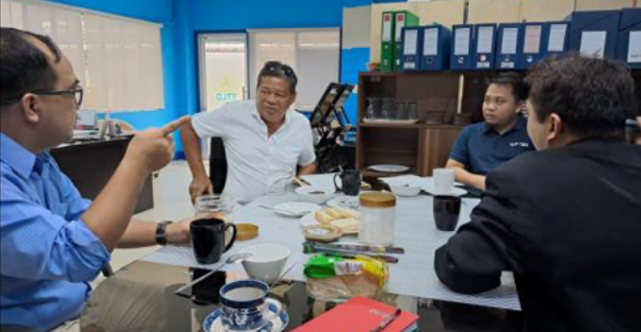
CSU partnered with the Department of Agriculture -Agricultural Training Institute (ATI), Region 13 for Techno Gabay Program Implementation
The Department of Agriculture – Agricultural Training Institute (DA-ATI), Region 13, in line with the Techno Gabay Program under Executive Order 801, s. 2009, has reinforced its mission to facilitate the effective dissemination of agricultural technologies to local farmers and stakeholders. Caraga State University (CSU) plays an integral role as a partner agency and an active member of the Regional Technical Working Committee for the implementation of this program. This partnership highlights CSU’s commitment to community development and the advancement of agricultural practices within the region.
Mr. Rodel G. Pasion, the designated focal person representing CSU, has notably participated in the monitoring and evaluation activities of the Magsasaka Siyentista (MS) program. The evaluation aims to assess the progress and impact of the agricultural technologies being adopted and implemented by local farmer-leaders (Magsasaka Siyentista) in their respective areas.
During the second quarter of 2023, three MS sites were evaluated to gauge their alignment with the program’s objectives and the efficacy of technology transfer to local communities. The specific evaluations conducted were as follows:
- Carrascal, Surigao del Sur (MS 1). Date of Evaluation: April 12, 2023
This site was assessed for its adoption of technology in enhancing local farming practices. The evaluation focused on the integration of innovative techniques to improve crop yield and sustainable resource management.
- Esperanza, Agusan del Sur (MS 2). Date of Evaluation: April 27, 2023
This evaluation aimed to document and analyze the application of agricultural innovations tailored to the specific needs of the farmers in Esperanza. The team reviewed the effectiveness of training and support provided to the local MS in boosting community agricultural productivity.
The outcomes of these evaluations are essential for determining the overall impact of the Techno Gabay Program in promoting agricultural advancements and sustainability. They also offer insights into areas requiring further support or adjustments to optimize the dissemination of technology and enhance the productivity of local farming communities.
CSU, as a key partner, continues to support the DA-ATI’s initiatives through active participation in research, extension programs, and collaborative engagements that strengthen the agricultural capacity of the region. The collaborative efforts not only empower farmer-leaders but also contribute significantly to the socio-economic development of the communities involved.
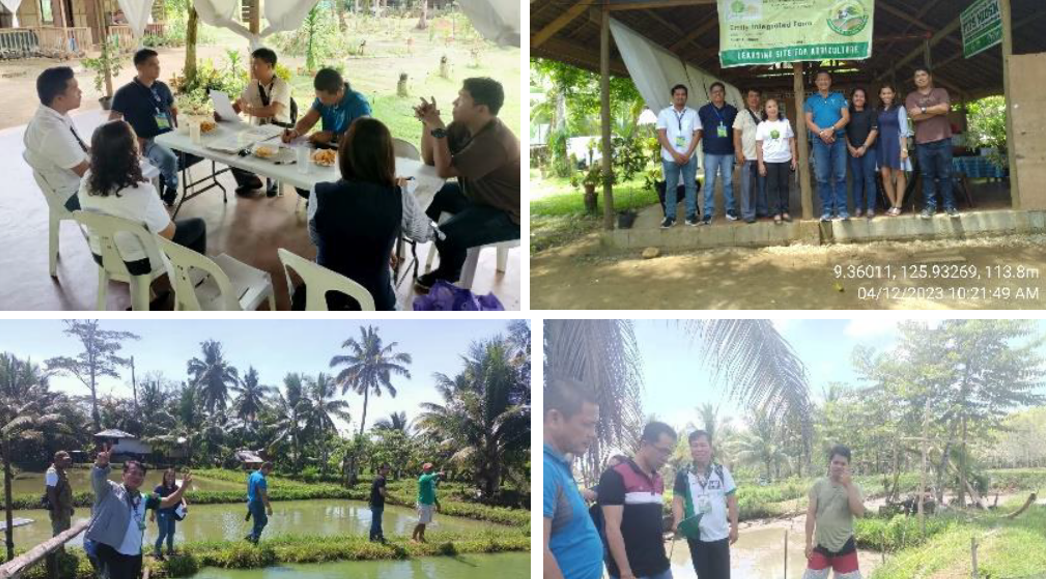
1.4.4. Policy addressing poverty
Participate in policy making at local, regional, national, and/or global level to implement programmes and policies to end poverty in all its dimensions.
Caraga State University (CSU) actively engages in policy-making processes at various levels to address and alleviate poverty in all its dimensions.
The university’s involvement includes:
- Research and Development Initiatives: CSU conducts research focused on socio-economic development, particularly in the Caraga Region. These research activities inform policy decisions and contribute to the formulation of strategies aimed at poverty reduction. The university’s Research and Development Office collaborates with government agencies and non-governmental organizations to ensure that research outputs are translated into actionable policies.
Document Link: https://www.carsu.edu.ph/;
Document Link: https://nro13.neda.gov.ph - Participation in Regional Development Councils: CSU representatives actively participate in regional development councils and committees specifically at the development of the National Economic Development (NEDA) Caraga Region Development Plan (RDP) 2023-2028, contributing expertise and insights to the creation and implementation of the development plans. This involvement ensures that educational perspectives are integrated into regional policies addressing poverty and related socio-economic issues.
The NEDA Caraga Region Development Plan (RDP) 2023-2028 aligns with SDG 1: No Poverty through a multi-dimensional approach that tackles the root causes of poverty and fosters sustainable economic empowerment. This plan emphasizes job creation, skill development, and support for MSMEs to stimulate local economies and promote inclusive growth. Investments in agricultural modernization, infrastructure enhancement, and renewable energy aim to improve productivity, food security, and access to markets and essential services. Additionally, comprehensive social protection programs, expanded access to basic services, and disaster resilience initiatives are integrated to safeguard the most vulnerable communities, providing them with the support needed to withstand economic and environmental shocks.
Key strategies include inclusive policy development that ensures equal opportunities, transparent governance, and participatory planning that engages communities in decision-making processes. The plan promotes grassroots involvement and public-private partnerships to implement poverty reduction initiatives effectively. Expected outcomes are a significant reduction in poverty incidence, increased community resilience, and equitable access to resources. A monitoring and evaluation framework is included to track progress, allowing for data-driven refinements and maximizing the impact of these poverty alleviation efforts, ensuring that no one is left behind in Caraga’s pursuit of sustainable development.
Document Link: https://nro13.neda.gov.ph/
Document Link: https://www.carsu.edu.ph/
Extension Programs and Community Engagement: Through its extension programs, CSU implements community-based projects that address poverty-related challenges. These programs often serve as pilot initiatives that, upon demonstrating success, can be scaled up and adopted into local and regional policies. By working directly with communities, CSU provides valuable data and feedback that inform policy adjustments and the development of new strategies.
Document Link: https://www.carsu.edu.ph/?q=page%2Ffunctions-and-objectivesRegional Policy Formulations:
Caraga State University support for Caraga Region’s policy development through the Regional Development Plan (RDP) 2023-2028
Document Link: https://nro13.neda.gov.ph/caraganons-pledge-support-for-regions-goals-toward-transformation
In the article from NEDA Caraga, “Caraganons pledge support for Region’s goals toward transformation,” the Caraga Regional Development Council (RDC) officially launched the Caraga Regional Development Plan (RDP) 2023-2028 on 09 August 2023 at the LMX Convention Center in Butuan City. Caraganons and stakeholders from all levels of government, the private sector, non-government organizations, the academe, media, and the youth came to witness the event and pledge their commitment to support the priorities and development directions embodied in the Plan.
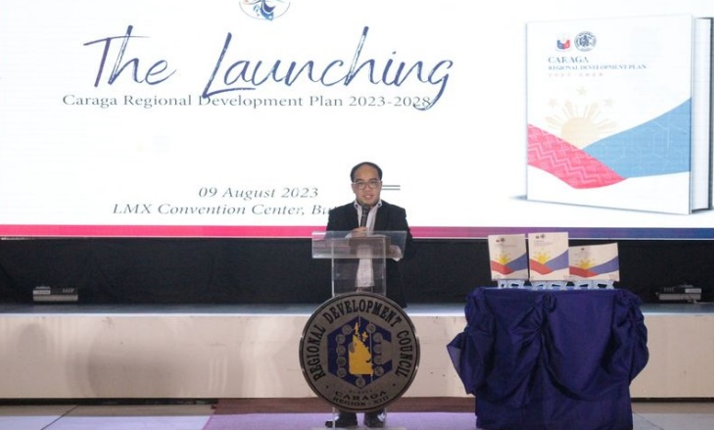
Dr. Jeffrey T. Dellosa, Vice President for Research Innovation and Extension of the Caraga State University (CSU), gave the message of commitment on behalf of CSU President Dr. Rolyn C. Daguil. 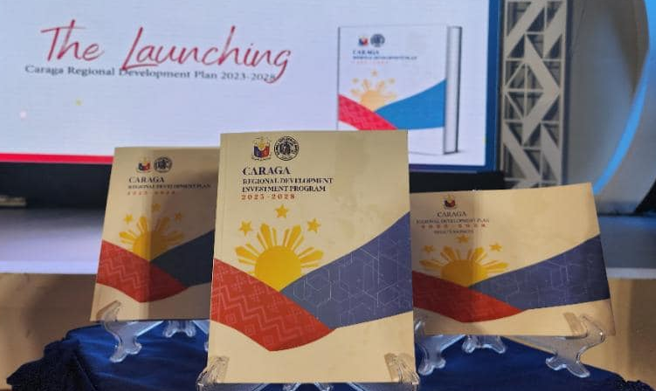
The Caraga Regional Development Plan (RDP) 2023-2028 and its accompanying documents, the Regional Development Investment Program (RDIP) 2023-2028 and Results Matrices (RM) 2023-2028
“As the champion of the Caraga RDP 2023-2028, RDC Chairperson and Province of Dinagat Islands Governor Nilo P. Demerey, Jr., called upon all sectors and all Caraganons to unite and commit to the implementation of the Caraga RDP 2023-2028. He reminded the stakeholders present that each one has a role in making a better future for Caraga and that coordinated efforts and synergy will bring about better results for the Region.”
“In response to Governor Demerey’s call to action, representatives from various sectors expressed their commitment to support the Plan. Among them are Presidential Assistant for Eastern Visayas Leo Tereso A. Magno, Surigao City Mayor Pablo Yves L. Dumlao II, Caraga State University President Rolyn C. Daguil, Department of Science and Technology RD Noel M. Ajoc, Department of Trade and Industry RD Gay A. Tidalgo, RDC-Private Sector Representative (PSR) for Ecotourism Robert Douglas O. Andaya, former RDC-PSR for Agriculture Engr. Vivencio P. Ocite, Jr., and Youth Representative May Princess J. Dorico.”
Regional SDG Catch-Up Plan
Caraga State University (CSU) has actively contributed to the development of the Caraga Sustainable Development Goals (SDG) Catch-Up Plan, a strategic initiative aimed at accelerating the region’s progress toward achieving the United Nations’ SDGs. This plan addresses areas where the region has lagged and outlines targeted interventions to meet the 2030 Agenda for Sustainable Development.
CSU’s Involvement in the Caraga SDG Catch-Up Plan:
- Research and Data Analysis:
CSU’s research departments have conducted studies to assess the region’s current status concerning various SDGs. These analyses have provided critical data to identify gaps and prioritize areas needing immediate attention.
- Capacity Building and Education:
The university has organized workshops and training sessions for local government units (LGUs) and community organizations. These programs aim to enhance understanding of the SDGs and equip stakeholders with the skills necessary for effective implementation of the catch-up strategies. - Community Engagement:
Through its extension programs, CSU has facilitated community consultations to ensure that the catch-up plan reflects the needs and aspirations of local populations. This participatory approach has been crucial in designing interventions that are both effective and sustainable.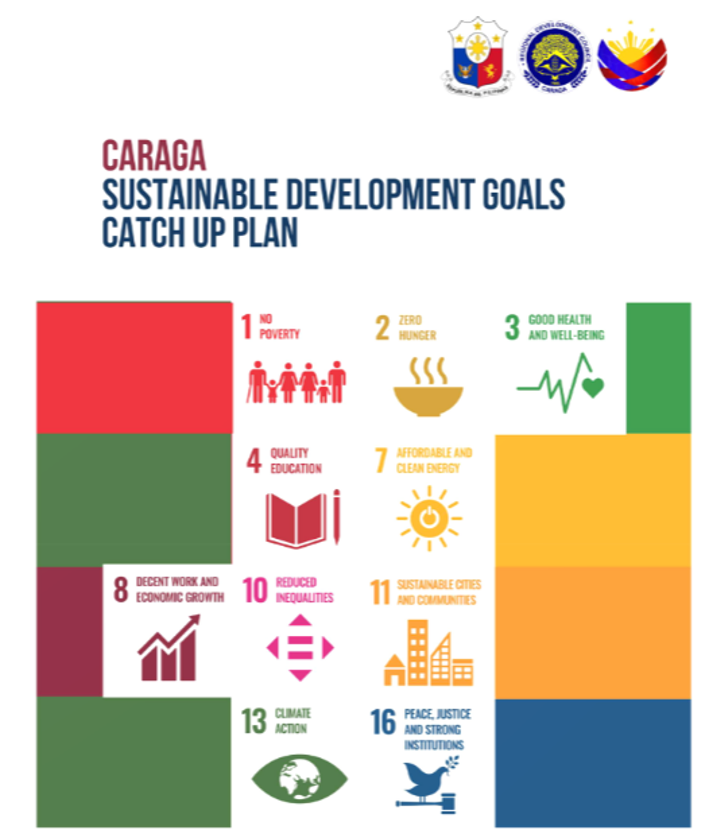
Figure shown above refers to the Caraga Catch-Up Plan for the SDGs. Link: https://nro13.neda.gov.ph/sdg-catch-up-plan
- Technical Assistance:
CSU has provided technical support in developing monitoring and evaluation frameworks to track the progress of the catch-up plan. This includes setting up indicators and benchmarks aligned with national and global SDG targets. - Innovation and Technology:
Leveraging its expertise in science and technology, CSU has introduced innovative solutions to address specific challenges identified in the catch-up plan. For instance, developing sustainable agricultural practices and renewable energy projects to promote environmental sustainability and economic growth.
CSU’s involvement underscores its commitment to regional development and its role as a catalyst for positive change in Caraga. By aligning its resources and expertise with the objectives of the SDG Catch-Up Plan, the university contributes significantly to the region’s efforts to achieve sustainable development and improve the quality of life for its residents.
Local Policy Formulations
Caraga State University (CSU) is committed to fostering community engagement and impactful participatory development that aligns with addressing poverty on local levels. The university emphasizes the co-design of community-centered initiatives through active collaboration with local communities to identify and address their specific needs. These initiatives leverage CSU’s academic resources and research capabilities to promote sustainable development and social empowerment (CSU Strategic Plan document link: https://sustainability.carsu.edu.ph/?page_id=651).
CSU’s policy approach involves partnerships and innovative strategies that integrate education, research, and direct community support. By enhancing its outreach and engagement, CSU actively participates in local and regional policy-making processes, contributing to the formulation and implementation of programs designed to reduce poverty and improve quality of life. This includes developing educational and research hubs that fuel local innovation, promote entrepreneurship, and foster skills that drive economic resilience CSU Strategic Plan document link: https://sustainability.carsu.edu.ph/?page_id=651.
The CSU Strategic Plan embeds efforts relevant to this goal within its broader strategic priorities. These include community engagement and participatory development initiatives aimed at identifying community needs and co-developing projects that contribute to social empowerment and sustainable development strategic initiatives align with SDG 1 through:
- Participatory Development: Collaborating with local communities to design initiatives that tackle specific needs, fostering sustainable solutions to poverty.
- Sustainable and Responsible Education: Integrating sustainability principles into curricula to prepare students to address real-world challenges, including poverty reduction demonstrate CSU’s commitment to leveraging educational and community resources to make meaningful contributions to local poverty alleviation.
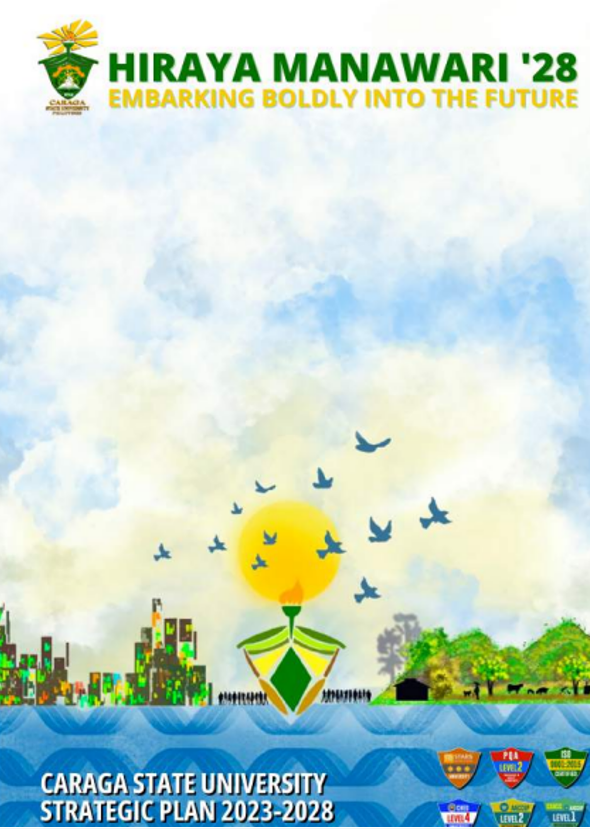
These activities highlight CSU’s commitment to contributing to policy-making processes aimed at eradicating poverty, leveraging its academic and research capabilities to influence and support effective policy development.
Building Partnerships for the Sustainable Development Goals
Caraga State University (CSU) has been actively building partnerships with a diverse range of organizations, both local and international, reflecting its commitment to advancing research, community development, and educational initiatives. The university’s partnerships in 2023, documented in a detailed list, emphasize collaborative engagements in areas spanning community welfare, technological development, agriculture, and environmental sustainability. Each Memorandum of Agreement (MOA) and Memorandum of Understanding (MOU) demonstrates CSU’s strategic alignment with government agencies, private sector partners, and international academic institutions to address regional and global challenges.
One of CSU’s prominent partnerships includes its collaboration with local government units (LGUs) and community organizations to foster development initiatives directly benefiting local communities. For instance, the MOA with Brgy. La Januza and the Gawad Kalinga Community Development Foundation represents a grassroots approach to social upliftment, aiming to address housing and community needs in Surigao del Norte. This partnership underlines CSU’s commitment to sustainable community development, a goal further extended through a similar partnership with Brgy. Abilan and the Gawad Kalinga Abilan Village in Butuan City. These initiatives highlight the university’s dedication to directly supporting marginalized communities, emphasizing its role as a vital contributor to local socio-economic growth.
Another significant sector that CSU focuses on through partnerships is health. The university’s MOA with MJ Santos Hospital underscores CSU’s contribution to healthcare advancements and potentially collaborative research in the health sciences. This partnership not only opens pathways for student internships but also aligns with CSU’s broader objective of integrating scientific research and healthcare services to improve the quality of life within the region.
CSU also prioritizes research and innovation in science and technology through collaborations with notable organizations and institutions. For example, the MOA with Bulacan State University and Huawei Technologies showcases CSU’s commitment to technological innovation. Huawei’s involvement potentially brings cutting-edge technologies and resources that can elevate CSU’s capacity in digital and technological education, ensuring that students and faculty members gain exposure to advanced tools and methodologies. This partnership is particularly significant in preparing CSU’s stakeholders for the demands of a rapidly evolving technological landscape.
Agricultural development, a crucial industry for the Caraga region, is well represented in CSU’s partnership portfolio. The university’s engagements with the Department of Agriculture (DA) and the Bureau of Agricultural Engineering aim to support research and development in sustainable agriculture. These collaborations potentially cover innovations in biotechnology and farm mechanization, promoting modern, efficient farming practices that could be transformative for the region’s agriculture-dependent economy. The university’s additional partnership with DA for the ‘Farm Vista’ project further solidifies its role as an academic institution that integrates agricultural expertise and regional needs, particularly in terms of sustainable farming.
Environmental sustainability is also a central theme in CSU’s partnerships. Collaborations with entities like the Philippine Institute of Volcanology and Seismology (PHIVOLCS) are vital for enhancing CSU’s research on disaster preparedness and environmental conservation. Similarly, the university’s alliance with DENR Region 13 highlights CSU’s commitment to environmental protection, enabling initiatives that can help mitigate the impacts of climate change, particularly relevant for the Philippines’ disaster-prone regions.
International partnerships play a prominent role in CSU’s global engagement strategy. Collaborations with institutions such as Hokkaido University, UP Diliman’s National Institute of Physics, and Stavanger University signify CSU’s goal to expand its research horizons and academic influence beyond the Philippines. Such international partnerships facilitate knowledge exchange, collaborative research, and even student and faculty mobility, enriching the university’s academic community and reinforcing its international standing. The MOU with Silla University in South Korea represents another valuable cross-border educational exchange that could bring significant benefits to CSU’s educational programs.
Moreover, CSU has also extended its partnerships into the realm of policy and governance. An MOU with NEDA-Caraga suggests that CSU is contributing to regional policy planning, potentially providing research-based insights that support sustainable development initiatives. This partnership reflects CSU’s increasing involvement in policymaking processes, ensuring that the university’s expertise in research and innovation actively informs the region’s developmental strategies.
Caraga State University’s diverse and strategic partnerships underscore its role as a key driver of regional development and innovation. By actively engaging with various sectors, CSU not only enhances its academic and research capabilities but also positions itself as a critical agent of positive change, addressing both local and global challenges. These partnerships showcase CSU’s commitment to creating a sustainable and prosperous future for the Caraga region, establishing a framework where education, research, and community development coalesce to make a lasting impact. Through these collaborations, CSU continues to empower its students, faculty, and communities, aligning with its mission of fostering a dynamic and inclusive environment for learning and development.
The date received from the Office of the President | OP Reference Slip Number | Document |
09/28/2023 | 2023-2-3494 | Memorandum of Agreement between CSU, Brgy. La Januza, GL, SDN, and Gawad Kalinga Community Dev’t Foundation, Inc. |
09/28/2023 | 2023-2-3494 | Memorandum of Agreement between CSU, LGU of Sibagat, ADS, and ECOWEB |
09/29/2023 | 2023-1-5883 | Memorandum of Agreement between CSU and MJ Santos Hospital |
09/29/2023 | 2023-1-5883 | Memorandum of Agreement between CSU, Brgy. Abilan, Butuan City, and Gawad Kalinga – Abilan Village |
09/29/2023 | 2023-1-5890 | Memorandum of Agreement between CSU, DA, and DOST |
09/28/2023 | 2023-1-5872 | Memorandum of Agreement between CSU, SumMo, and Apex Mining Co. Inc., |
10/09/2023 | 2023-1-6057 | Memorandum of Agreement between CSU, Bulacan State University, and Huawei Technologies |
10/10/2023 | 2023-1-6156 | Memorandum of Understanding between CSU and Project Caraga Group, Inc. |
10/18/2023 | 2023-1-6456 | Memorandum of Agreement between CSU and MSU-IIT NMPC |
10/19/2023 | 2023-1-6498/1-4599 | Memorandum of Agreement between CSU and LGU – Alegria, SDN |
10/24/2023 | 2023-1-6617 | Memorandum of Understanding between CSU and USEP |
10/24/2023 | 2023-1-6617 | Memorandum of Agreement between CSU and PHIVOLCS |
10/26/2023 | 2023-2-3922 | Memorandum of Agreement between CSU and LANDBANK Countryside Development Foundation |
Memorandum Order 048-B - Mandate to Prioritize Admission of Students from the Bottom 20% Household Income Group
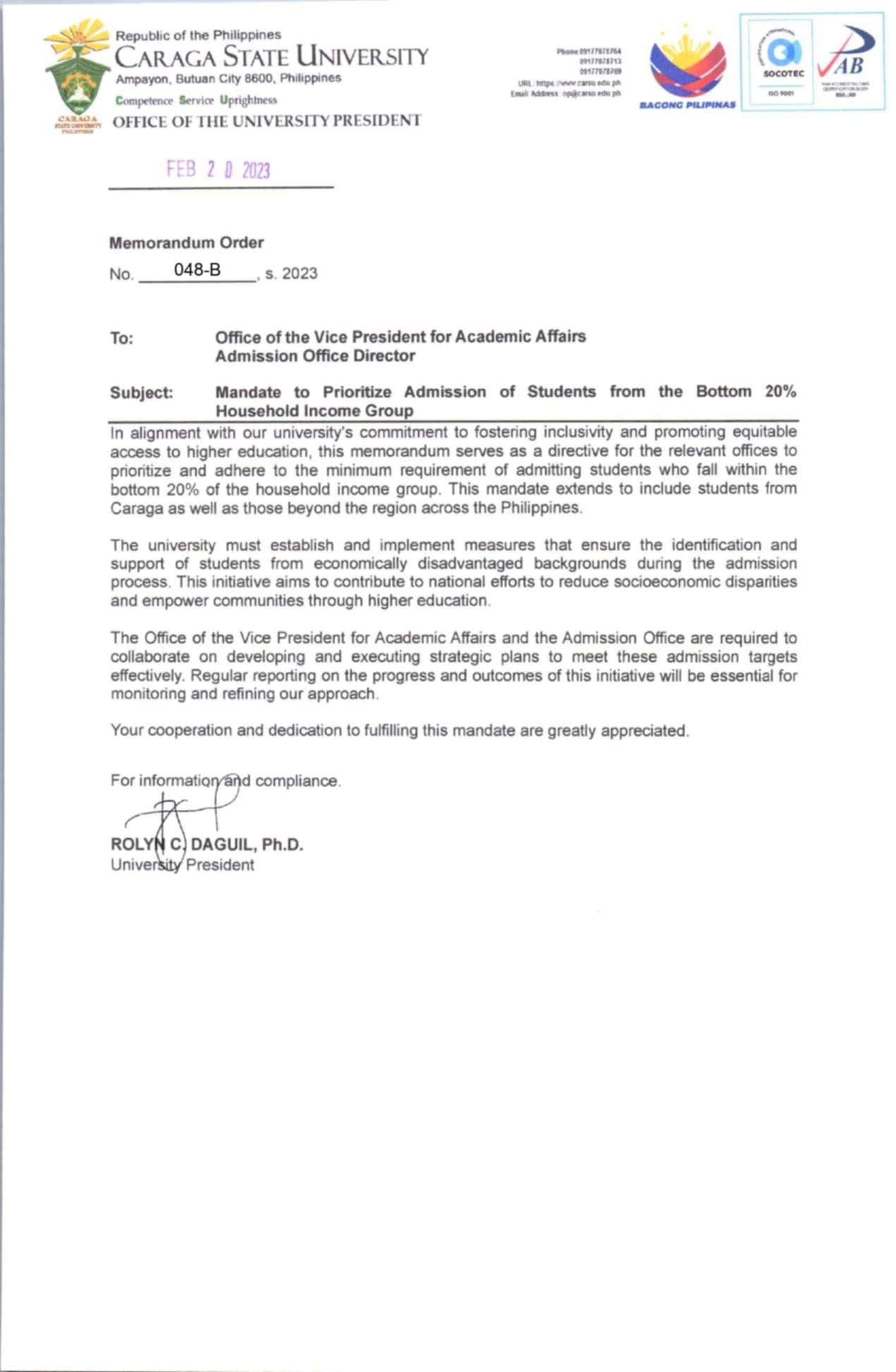
Memorandum Order 048-A - Graduation/Completion Targets for Students in the Bottom 20% Income Group
